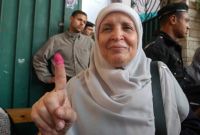
Egyptian voting has started
afrol News, 9 November - The first set of polls to determine Egypt’s new parliament started today. While the ruling National Democratic Party (NDP) is widely expected to win again, opposition parties have experienced a far freer environment than they are used to in an Egyptian campaign. The opposition Muslim Brotherhood however claims "there is fraud everywhere."
Egyptian voters in eight of the country’s 26 governorates are going to poll stations today, in the first day of a complicated process that does not end until December. Two more election days are planned for voters from other governorates. Cairo residents, such as President Hosni Mubarak, however were free to cast their vote today.
As part of Egypt’s pro-democracy reform process, today’s election nevertheless play an important role and seem to count on a greater interest than previous legislative polls. Only party’s getting a parliamentary group of more than 22 may present a candidate to the next presidential elections. Further, the opposition has been much freer to campaign than at earlier crossroads.
During the October and November 2000 legislative elections in Egypt, opposition parties were physically stopped from campaigning and voting. Violence broke out between police officers and opposition militants.
Such scenes were avoided this year as the divided opposition was left campaigning freely. However, only the ruling NDP was given real access to Egypt’s dominant state media, which openly run campaigns for the party of President Mubarak.
Local and international observers thus do not give the opposition much hope in these elections, although they are expected to increase their representation in parliament. Currently, four opposition groups only hold 17 out of 444 parliamentary seats, in addition to 37 independents. The NDP is expected to maintain a solid majority in the new parliament as well.
Apart from the unfair access to campaigning in state media, several opposition members attribute this pessimism to the widespread election fraud they allege. While the campaign and voting seems to be smooth this year, authorities plan to manipulate the counting and tabulation processes, they claim to know. Also Egyptian human rights groups claim to have parallel information.
Further, one of the most popular opposition groupings, the Muslim Brotherhood, has been banned as a party. The Brotherhood has a large number of candidates that have been allowed to campaign as independents, but the party ban will affect on its representation in parliament. Further, it will prevent the Muslim Brotherhood from nominating a candidate to the 2011 presidential elections.
"There is fraud everywhere, no transparency, no freedom," Muslim Brotherhood supreme leader Mohammed Mehdi Akef told the Cairo-based ’Middle East Times’ after casting his vote. "The regime is determined to continue on the path of corruption," he added. Mr Akef was described as the leader of the movement that "clearly emerged as the main opposition force during the campaign."
Today, however, a larger than normal number of Egyptians seems to cast their votes. The first results may be expected within this week. Then, several districts are expected to hold run-off polls on 15 November to elect an MP for districts where no candidate gained more than 50 percent of the vote. Voters from other governorates are to go to the polls on 20 November and 1 December.
By staff writers